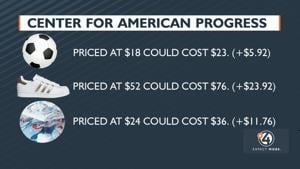SPOKANE, Wash. — Being a parent is expensive, and for many families across the Inland Northwest, summer — while filled with fun and outdoor activities — can also bring added financial stress.
As school lets out, parents often turn to summer camps, swim lessons, and outdoor adventures to keep kids busy. That also means new seasonal purchases: swimsuits, pool toys, and sports gear. But with President Donald Trump’s recent tariff policies, this summer could cost families even more.
Last week, President Trump announced lower tariffs for several countries, but those reductions could expire in less than 90 days. In the meantime, tariffs on goods from three of the United States’ largest trading partners — Canada, Mexico, and China — remain in place.
Economist Ryan Herzog says families should prepare now for a potentially costly summer.
“If you need something and you know you’re going to need that — a computer, a couch, clothes — maybe now, if you can afford to, is the time to buy,” Herzog said.
He explained that rising tariffs will likely impact nearly every category of consumer goods, meaning families could soon be forced to make difficult choices — including cutting back on travel, meals out, or even canceling summer plans entirely.
According to the Center for American Progress, if tariffs are implemented after the 90-day window, price hikes could be substantial. Examples include:
A soccer ball made in Pakistan, currently priced at $18, could cost $23.Children’s sneakers from Vietnam, now $52, could jump to $76.A toddler’s clothing set from Cambodia, priced at $24, could rise to $36.
Even secondhand stores may feel the strain, with increased demand expected from families looking to save. Herzog recommends stocking up now on essential items and turning to community resources later if necessary.
And while summer is already expensive, back-to-school season may hit wallets even harder.
New backpacks, shoes, calculators, and computers are common purchases for school-aged children. For college students, the list gets longer — bedding, furniture, and electronics often top the list.
“You’re already doing everything you can to get your kids something new. And here comes another policy that’s going to raise the price of shoes by $10. That may not seem like much, but for families with multiple kids, it adds up fast.”
Exemptions on electronics, oil, and energy could help ease the burden, but most household goods will still be affected by rising prices.
Herzog’s final piece of advice: buy now, save later.
COPYRIGHT 2025 BY KXLY. ALL RIGHTS RESERVED. THIS MATERIAL MAY NOT BE PUBLISHED, BROADCAST, REWRITTEN OR REDISTRIBUTED.


